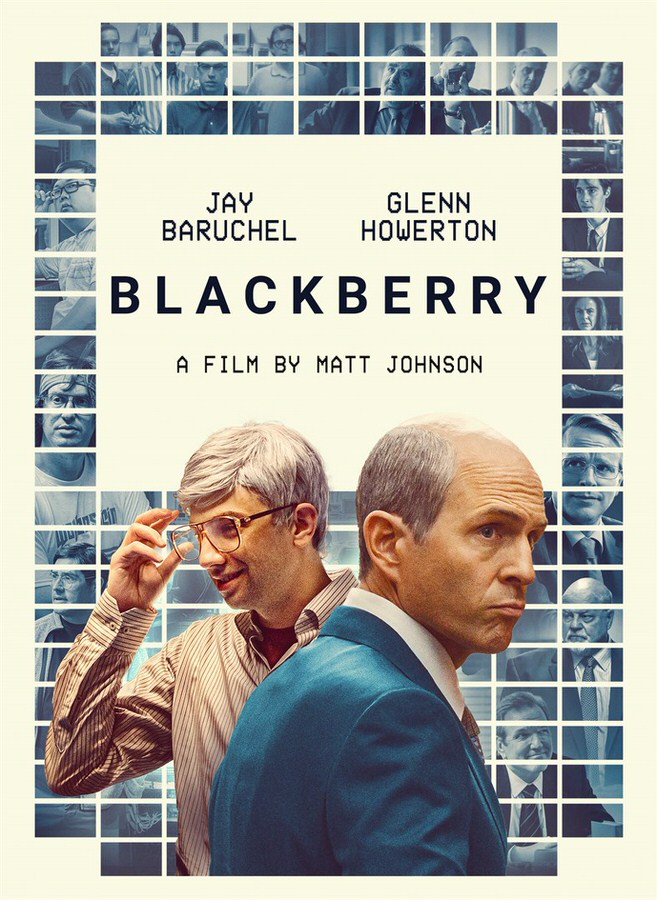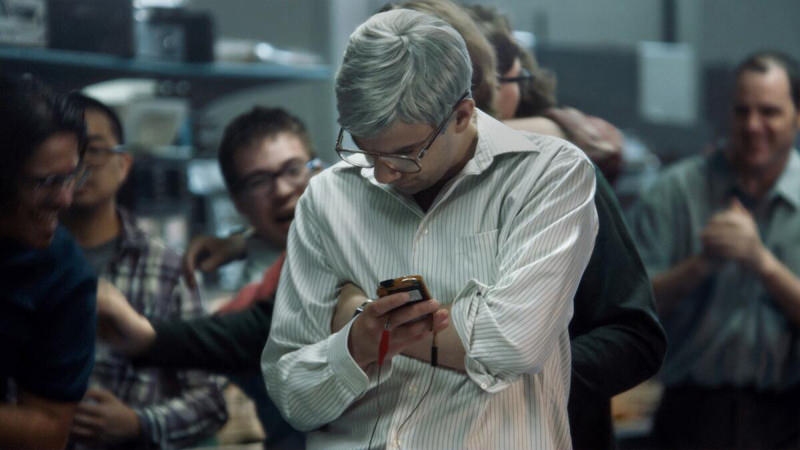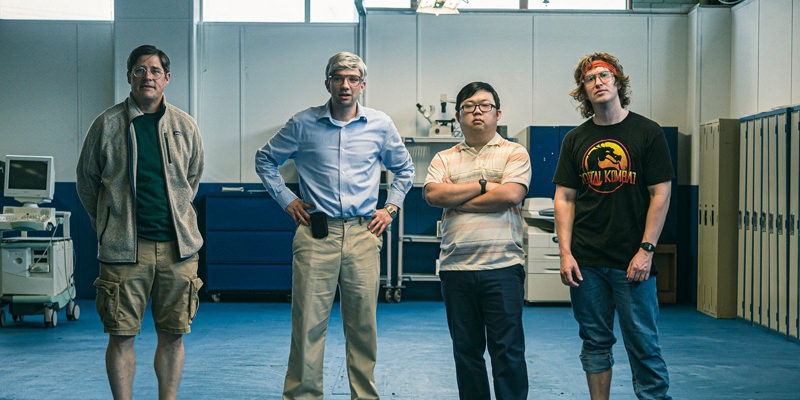BlackBerry
Directed by Matt Johnson (2023) ****
 You may be forgiven for lumping director Matt Johnson’s BlackBerry in with a wave of product history films (the Air Jordan in Air, 2023; the video game Tetris, 2023; Facebook in The Social Network, 2010; Apple computers in Steve Jobs, 2015 — to name a few). Johnson’s vital, careening take on the rise and fall of the first addictively popular smartphone succeeds because it’s also an absorbing tale of conflicting personalities. At the center of BlackBerry is a love/hate triangle: the inventor/perfectionist Mike Lazaridis (Jay Baruchel of This Is the End), the driven exploiter CEO Jim Balsillie (Glenn Howerton, of It’s Always Sunny in Philadelphia) and the socially inept tech geek Doug Fregin (played by the director himself).
You may be forgiven for lumping director Matt Johnson’s BlackBerry in with a wave of product history films (the Air Jordan in Air, 2023; the video game Tetris, 2023; Facebook in The Social Network, 2010; Apple computers in Steve Jobs, 2015 — to name a few). Johnson’s vital, careening take on the rise and fall of the first addictively popular smartphone succeeds because it’s also an absorbing tale of conflicting personalities. At the center of BlackBerry is a love/hate triangle: the inventor/perfectionist Mike Lazaridis (Jay Baruchel of This Is the End), the driven exploiter CEO Jim Balsillie (Glenn Howerton, of It’s Always Sunny in Philadelphia) and the socially inept tech geek Doug Fregin (played by the director himself).
Johnson’s story begins modestly in Ontario with Mike and Doug awkwardly lugging (and dropping), on the way to a pitch meeting, an easel board presentation of the product they hope to develop and sell: Pocket Link. The product invented at their small and grungy Research in Motion aims to cram a computer inside a phone that functions as a pager, cellphone and an email machine all at once. Their presentation to high strung, all-business Jim Balsillie (an executive about to be shunted from the corporation he works for) is seemingly a bust (when Doug uses the Force as a metaphor, Jim’s face is a blank. Doug: “Have you ever seen Star Wars?” Jim: “No.”). Later, though, out of a job, Jim offers to promote the device and invest money (by mortgaging his house) for a co-CEO role and one third ownership of the company. This means taking charge of the geeky frat-boy antics culture of the fledgling company, where Movie Night and video games seem as equally important as product development.
After the newly named BlackBerry is offered to Bell Atlantic (now Verizon), the phone succeeds in the marketplace beyond anyone’s expectations (Research in Motion, which began with ten employees, expanded to many thousands). The dissimilarities between the company’s heads accentuate, too; Doug is forced to watch from the sidelines as the workplace culture is irrevocably changed; eventually a hulking corporate wrangler (Michael Ironside, Scanners)  is brought in to coral the office nonsense with Glengary Glen Ross-like pronouncements. Meanwhile, Jim is using dubious legal tactics to drag in new talent and, at the same time, trying to fight off a hostile takeover by the makers of the PalmPilot.
is brought in to coral the office nonsense with Glengary Glen Ross-like pronouncements. Meanwhile, Jim is using dubious legal tactics to drag in new talent and, at the same time, trying to fight off a hostile takeover by the makers of the PalmPilot.
Even the casual non-observer of technological trends will remember when Apple’s iPhone was announced. In addition to its many other improvements to the BlackBerry’s capabilities, it did away with a physical keyboard, opting for a touchscreen only visible when needed. Nearly overnight, the BlackBerry was made obsolete. During its heyday, though, it was quite the catch. I remember well when it was introduced to the corporate culture I worked in. Who would get to use one and who wouldn’t separated the important from the unimportant as sharply as a line drawn on the floor. Many hours were spent researching and acquiring BlackBerrys, training for them, assigning them, making sure they were charged and up to date. Keeping track of who had them at any given time was practically a part-time job. The popular cultural slang for them, CrackBerry, was well deserved.
 Though based on a non-fiction book, Losing the Signal: The Untold Story Behind the Extraordinary Rise and Spectacular Fall of BlackBerry. by Jacquie McNish and Sean Silcoff, Johnson’s telling takes some liberties with facts and chronological events (and, of necessity, leaves out much interesting that could be visited concerning Research in Motion’s earlier, groundbreaking history). The characters, though, take precedence. Lazaridis’ insistence on technology made with integrity and quality is brought to the screen absorbingly by Baruchel, while Glenn Howerton as Jim tears through the picture like a headstrong bull, surrounded by a swarm of calves threatening to block his path. You won’t quickly forget these unlikely collaborators without whom, despite their flaws, the BlackBerry wouldn’t have achieved what success it attained.
Though based on a non-fiction book, Losing the Signal: The Untold Story Behind the Extraordinary Rise and Spectacular Fall of BlackBerry. by Jacquie McNish and Sean Silcoff, Johnson’s telling takes some liberties with facts and chronological events (and, of necessity, leaves out much interesting that could be visited concerning Research in Motion’s earlier, groundbreaking history). The characters, though, take precedence. Lazaridis’ insistence on technology made with integrity and quality is brought to the screen absorbingly by Baruchel, while Glenn Howerton as Jim tears through the picture like a headstrong bull, surrounded by a swarm of calves threatening to block his path. You won’t quickly forget these unlikely collaborators without whom, despite their flaws, the BlackBerry wouldn’t have achieved what success it attained.
—Michael R. Neno, 2024 February 23